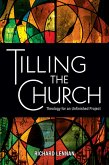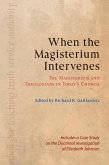What in the world is postmodernity? Is it the dominant reality today? If it is, what does it mean to be a church in a postmodern world? It seems that the church had a difficult time coming to terms with a modern world, an era ruled by the claims of scientific certainty. Having done so, more or less, it is now confronted by the claims of postmodernity, which seem to reverse the whole equation, to say that certainty and objectivity are chimeras. What is truth?" Pilate asked, and postmodernity 'at least as caricatured by its opponents 'responds: "There's no such thing."
Gerard Mannion, in Ecclesiology and Postmodernity, addresses the situation of the church in a postmodern world. The fundamental changes in human society and culture wrought by the twentieth century require the church to consider its response in the twenty-first century. What is the church's moral Vision, how does its practice look, what is the nature of its aspiration toward holiness in our times? Mannion believes that since Vatican II, the Catholic Church has been in a kind of limbo, awaiting a Vision of its own life for the future. Rather than focusing on specific controversies, Mannion offers concrete suggestions about how the church can create a better harmony between its own self-understanding, its ecclesiological Vision, and its day-to-day life, its ecclesial practice.
Gerard Mannion, PhD, educated at King's College, Cambridge University and New College, Oxford University, is Associate Professor of Ecclesiology and Ethics in the Department of Theology and Religious Studies at Liverpool Hope University, UK. He is also the director of Church In Our Times: Centre for the Study of Contemporary Ecclesiology, co-director of the Applied Ethics Initiative at Liverpool Hope, co-chair of the AAR (American Academy of Religion) Ecclesiological Investigations Program Unit and co-ordinator of the Ecclesiological Investigations International Research Network. Mannion is the author of Schopenhauer, Religion and Morality and co-editor of Readings in Church Authority 'Gifts and Challenges for Contemporary Catholicism, both published by Ashgate in 2003, and co-editor of the forthcoming volumes The Routledge Companion to the Christian Church andCatholic Social Justice: Theological and Practical Explorations.
"
Dieser Download kann aus rechtlichen Gründen nur mit Rechnungsadresse in A, D ausgeliefert werden.









